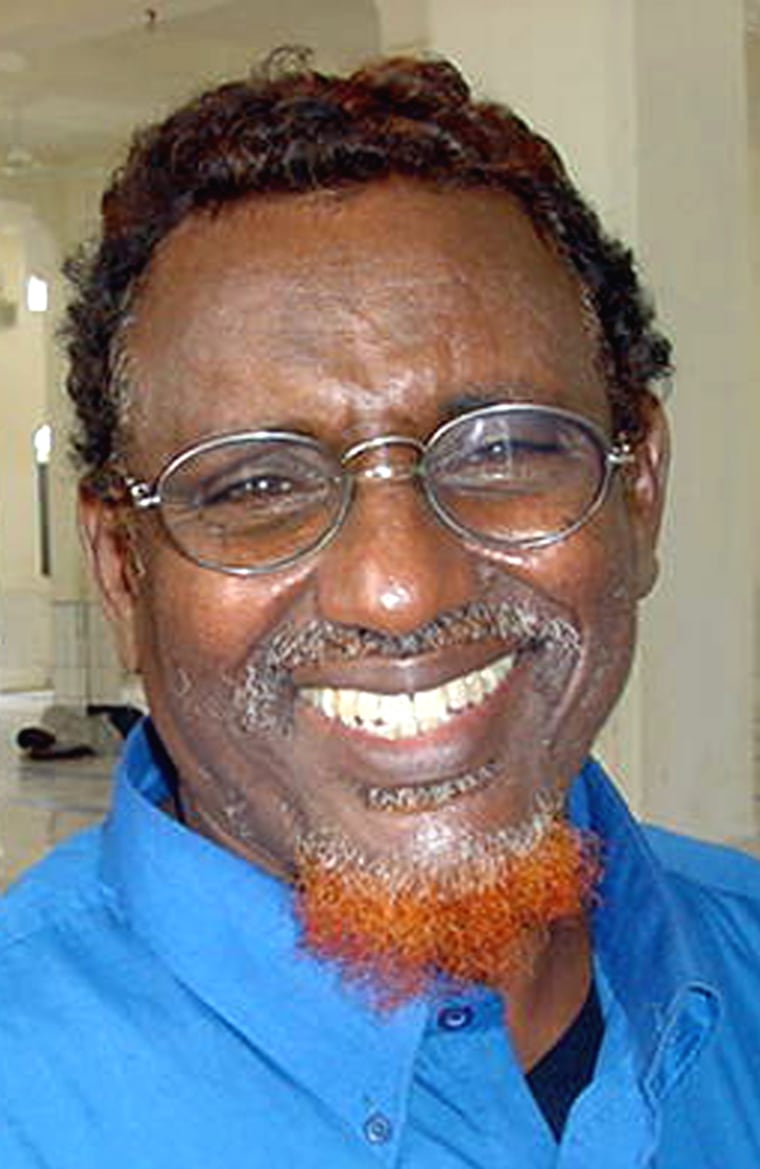The radical cleric named to lead the Muslim militia controlling most of Somalia’s south said Monday that he envisions an Islamic state, a stand likely to reinforce U.S. fears the nation could become a haven for extremists.
Sheikh Hassan Dahir Aweys, who already was on the U.S. terrorist watch list as a suspected collaborator with al-Qaida, made the comment while discussing efforts to form a functioning central government in Somalia for the first time in 15 years.
“Somalia is a Muslim nation, and its people are also Muslim, 100 percent. Therefore any government we agree on would be based on the holy Quran and the teachings of our Prophet Muhammad,” Aweys told The Associated Press in a telephone interview, his first comments to the media since being named head of the Islamic militia Saturday.
The militia defeated an alliance of U.S.-backed secular warlords this month to take control of the Somali capital, Mogadishu, and now holds sway over much of southern Somalia.
Collision course
Aweys’ stance could put Somalia on a collision course with the United States and the United Nations. The previous militia leader, Sheikh Sharif Sheikh Ahmed, had been reaching out to the West and Somalia’s largely powerless U.N.-backed interim government.
The 71-year-old Aweys, speaking from his home in central Somalia, condemned Western-style democracy and said he was under no obligation to abide by the wishes of the West.
“It is not compulsory for us to hate what the Westerners hate,” said Aweys, a former military colonel.
“Our relationship with the U.S. administration will depend on how the U.S. treats us,” he added. “If it treats us well, we will also treat them well. If it behaves badly, it will be responsible.”
The U.S. government took a cautious stance, saying it had no plans to engage with Aweys but adding it was not ready to conclude he wants to turn Somalia into a terrorist state.
Wait and see
State Department spokesman Sean McCormack said the United States would wait to see if the militia shows a commitment to fight terrorism, makes an effort to meet the humanitarian needs of the Somali people and works with the interim government.
“If they want to have partners in the international community, if they want to work with the U.S., they want to work with the other members of the international community, we’ll see if they meet those standards,” McCormack said.
After the Sept. 11, 2001, attacks on New York and Washington, the United States put Aweys on a terrorist watch list because he and an Islamic group he founded — al-Itihaad — were believed to have had links to Osama bin Laden while bin Laden was living in Sudan in the early 1990s. U.S. officials have not elaborated on the alleged links.
Aweys went into hiding after the 9/11 attacks and didn’t re-emerge until August 2005, when he helped found the Islamic militia, now known as the Somali Supreme Islamic Courts Council. He told the AP previously that al-Itihaad no longer existed and that he had no ties to al-Qaida.
Omar Jamal, director of the Somali Justice and Advocacy Center in St. Paul, Minn., a hub for expatriate Somalis, said he was troubled by Aweys’ rise to power.
“The election of Aweys is a clear signal that the moderates are losing, and extremists are taking the lead, and now the next possible step is that they will impose a Taliban style of government,” he said, referring to the strict Islamic militia that was ousted by a U.S.-led war in Afghanistan.
Underlining the apparent tougher line, militia leaders said Monday that they will publicly stone to death four suspected rapists if they are convicted in Jowhar, 55 miles from Mogadishu.
Concern in Washington
The appointment of Aweys as the group’s leader is likely to stoke Washington’s long-standing concern that Somalia will become a refuge for members of bin Laden’s terror network, much like Afghanistan did in the late 1990s.
The U.S. government previously accused the militia of harboring al-Qaida leaders responsible for deadly 1998 bombings at the U.S. embassies in Kenya and Tanzania.
Aweys said Monday that he did not know of any terrorists in Somalia. “If we discover them we will take suitable steps against them,” he said.
His predecessor, Sheikh Ahmed, agreed last week to negotiate with the interim government, which was formed with U.N. help two years ago but failed to assert power. It’s based in Baidoa, 90 miles from Mogadishu.
The interim constitution adopted by the interim body makes no reference to Islam.
Aweys said Somalis want an Islamic state, and said he will raise the topic when he honors Ahmed’s agreement to meet with government leaders next month.
None of the militia leaders who voted for the change in leadership over the weekend publicly explained it. Ahmed, the previous leader, told the AP he was upset that news of the group’s restructuring had been leaked and said more changes were in the works.
Mogadishu resident Omar Gudle said the capital was tense.
“We are really scared. We don’t know what is going on,” he said. “Anything could happen.”
